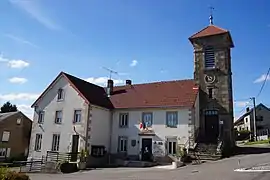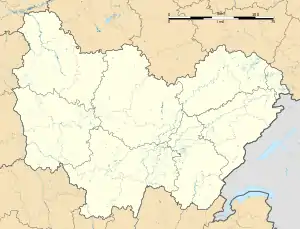Frédéric-Fontaine
Frédéric-Fontaine (French pronunciation: [fʁedeʁik fɔ̃tɛn]) is a commune in the Haute-Saône department in the region of Bourgogne-Franche-Comté in eastern France.
Frédéric-Fontaine | |
|---|---|
 The town hall and Protestant church in Frédéric-Fontaine | |
 Coat of arms | |
Location of Frédéric-Fontaine | |
 Frédéric-Fontaine  Frédéric-Fontaine | |
| Coordinates: 47°39′27″N 6°37′49″E | |
| Country | France |
| Region | Bourgogne-Franche-Comté |
| Department | Haute-Saône |
| Arrondissement | Lure |
| Canton | Héricourt-1 |
| Government | |
| • Mayor (2020–2026) | Vincent Schiessel[1] |
| Area 1 | 3.48 km2 (1.34 sq mi) |
| Population | 259 |
| • Density | 74/km2 (190/sq mi) |
| Time zone | UTC+01:00 (CET) |
| • Summer (DST) | UTC+02:00 (CEST) |
| INSEE/Postal code | 70254 /70200 |
| Elevation | 334–498 m (1,096–1,634 ft) |
| 1 French Land Register data, which excludes lakes, ponds, glaciers > 1 km2 (0.386 sq mi or 247 acres) and river estuaries. | |
Frédéric-Fontaine near Etobon, was established in 1603 by the Duke Frederick of Wurtemberg as a haven for persecuted Swiss Protestants and others from France. He found a cool spring here on a hunting trip in 1586, hence the “fountain.” [3] Fourteen founding families settled here in the early 17th century. Continued pressure on religious freedom, European conflicts (such as the War of the Austrian Succession) and lack of economic opportunity led some families from Frédéric-Fontaine to emigrate, mainly to North America. Many of these families, alongside others in the region and also from the Palatinate, boarded ships in the 1750s for Nova Scotia as part of the British scheme to settle newly acquired colony with Foreign Protestants to supplant the local French Catholic population.[4]
References
- "Répertoire national des élus: les maires" (in French). data.gouv.fr, Plateforme ouverte des données publiques françaises. 13 September 2022.
- "Populations légales 2020". The National Institute of Statistics and Economic Studies. 29 December 2022.
- "Histoire - Commune de Frédéric-Fontaine en Haute-Saône
- South Shore Now - "The Foreign Protestants" Archived 2014-08-11 at the Wayback Machine